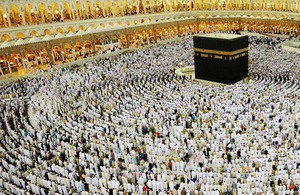Hajj pilgrims reminded if unwell not to make the trip this year
Check the latest health advice before travelling, in the light of the on-going cases of Middle East respiratory syndrome coronavirus (MERS-CoV).

Public Health England (PHE) and National Travel Health Network and Centre (NaTHNaC) are reminding people planning to travel to Saudi Arabia for the annual Hajj pilgrimage to check the latest health advice issued in light of on-going cases of respiratory illness caused by the Middle-East Respiratory Syndrome coronavirus (MERS-CoV).
Dr Brian McCloskey, director of global health at PHE, said:
The potential for spread of infectious diseases associated with mass gatherings is well recognised. Hajj, the annual mass gathering of over three million Muslims from all over the world, presents challenges every year, but particularly this year as we are continuing to receive reports of cases of MERS in the region.
Dr Dipti Patel, joint director at NaTHNaC, said:
While there are no travel restrictions to the Middle East and the risk to travellers remains very low, the Saudi Arabian Ministry of Health has advised vulnerable people and children who may have been planning to travel to the Middle East to perform the Hajj to postpone their pilgrimage for their own health and safety.
Other people should continue with their plans but follow the specific guidance on the Hajj and other general advice about staying safe and healthy when travelling, including practising good personal hygiene.
It’s very important that anyone who does become ill while making the pilgrimage urgently reports to the health authorities, so they can receive appropriate treatment and avoid spreading illness to others.
Dr Shuja Shafi, deputy secretary general at the Muslim Council of Britain said:
The Hajj is the largest annual international gathering with more than three million Muslims travelling from around the world to make the pilgrimage, including thousands from the UK. Advice issued by the Saudi Arabian Ministry of Health recommended that the elderly, those with chronic diseases, pregnant women and children postpone the performance of the Hajj for their own health and safety.
People who have decided to go on Hajj this year and are unwell before travelling are being advised not to travel. For those who have decided to travel it’s very important to follow health advice to reduce the risk of infection and to report to the health authorities if they become unwell.
Ends
Notes to editors
- PHE and NaTHNaC have put together an information leaflet highlighting the main health issues for Hajj pilgrims.
- For the latest travel advice, visit the NaTHNaC website.
- General travel health advice for travellers to Saudi Arabia.
- For more information about MERS-CoV visit PHE’s dedicated webpages.
- More advice from the Saudi Arabian Ministry of Health.
- Public Health England’s mission is to protect and improve the nation’s health and to address inequalities through working with national and local government, the NHS, industry and the voluntary and community sector. PHE is an operationally autonomous executive agency of the Department of Health.
www.gov.uk/phe Follow us on Twitter @PHE_uk
UKHSA press office: National Infection Service
UKHSA press office, infectious diseases
61 Colindale Avenue
London
NW9 5EQ